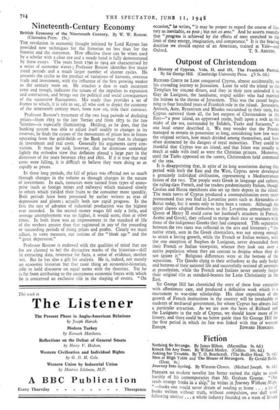Nineteenth-Century Economy
British Economy of the Nineteenth Century. By W. W. Rostow. (Clarendon Press. 15s.) THE revolution in economic thought initiated by Lord Keynes has provided new techniques for the historian no less than for the theorist and the statesman. How effective these can be when used by a scholar with a clear eye and a steady hand is fully demonstrated by these essays. The years from 1790 to 1914 are characterised by a series of economic waves ; Professor Rostow identifies five major trend periods and a much larger number of shorter cycles. He presents the cycles as the product of variations of harvests, overseas trade and investment, with the influence of the first growing weaker as the century wore on. He attaches a date to each recurrent crest and trough, indicates the nature of the impulses to expansion and contraction, and brings out the political and social consequences of the successive fluctuations. His study thus provides a set of frames to which, it is safe to say, all who seek to depict the economy of the nineteenth century must, from now on, trim their canvases.
Professor Rostow's treatment of the two long periods of declining prices—from 1815 to the late 'forties and from 1873 to the late 'nineties—is especially illuminating. Holding, as he does, that the banking system was able to adjust itself readily to changes in its reserves, he finds the causes of the movements of prices less in forces operating from the gold-fields or the Bank parlour than in changes in investment and real costs. Generally his arguments carry con- viction. It must be said, however, that he dismisses somewhat lightly the orthodox view that deflation played a large part in the distresses of the years between 1815 and 1821. If it is true that real costs were falling, it is difficult to believe they were doing so as rapidly as prices.
In these long periods, the fall of prices was effected not so much through changes in the volume as through changes in the nature of investment. In each, resources were turned from types of enter- prise (such as foreign mines and railways) which matured slowly to others which yielded their fruits to the consumer more speedily. Both periods have been presented by earlier writers as eras of depression and gloom ; actually both saw rapid progress. In the first the rate of advance of industrial production was the highest ever recorded. In the second money wages fell only a little, and average unemployment was no higher, it would seem, than at other times. In both there was an improvement in the standard of life of the workers greater than that registered in any •of the preceding or succeeding periods of rising prices and profits. Clearly we must adjust, in some measure, our notions of the " bleak age " and the " great depression."
Professor Rostow is endowed with the qualities of mind that are (or are claimed to be) the distinctive marks of the historian—skill in extracting data, reverence for facts, a sense of evidence, mother wit. But he has also a gift for analysis. He is, indeed, not merely an economic historian but that rarer thing an economist-historian, able to hold discourse on equal terms with the theorists. Yet he is far from attributing to the anonymous economic forces with which he is concerned an exclusive role in the shaping of events. " On
occasion," lie writes, "it may be proper to regard the course of his- tory as inevitable, ex post ; but not ex ante." And he asserts roundly that "progress is achieved by the efforts of men stretched to the limit of their energy, imagination, and competence." It is the bracing doctrine we should expect of an American, trained at Yale—and






























 Previous page
Previous page